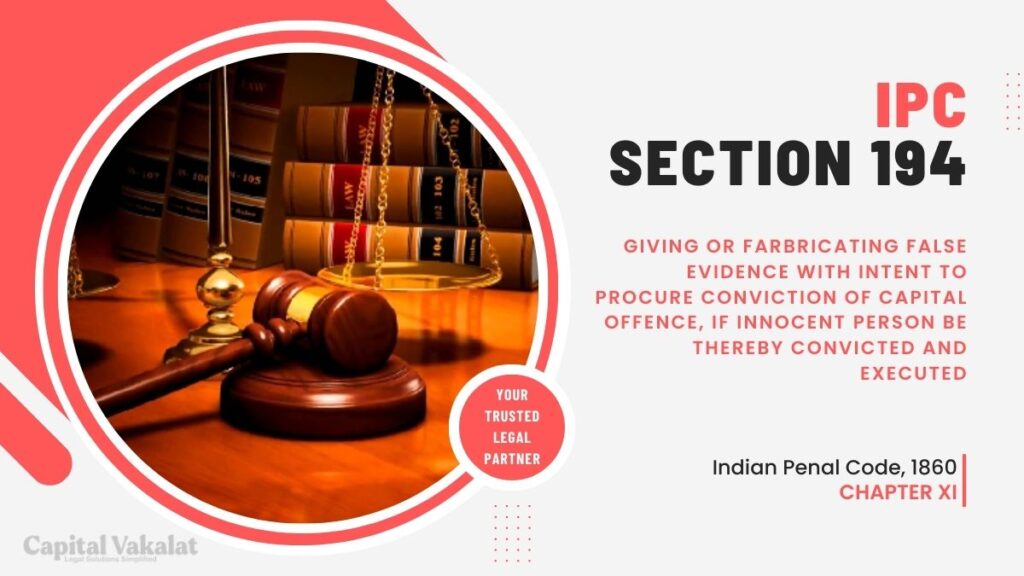Section 194 of the Indian Penal Code (IPC) deals with the grave offense of giving or fabricating false evidence with the intent to procure the conviction of a person for a capital offense, resulting in their wrongful execution. This legal provision holds immense significance in upholding the principles of justice and ensuring that innocent individuals are not unjustly punished.

In this article, we will delve into the various aspects of Section 194 IPC, its historical context, implications, and the role of this provision in safeguarding the innocent.
Understanding False Evidence in Capital Offence Cases
Before we delve into the intricacies of Section 194 IPC, it is essential to comprehend the concept of false evidence in cases involving capital offenses. False evidence refers to any testimony, documents, or statements presented in a court of law with the knowledge that they are untrue and are meant to mislead the judiciary. In the context of capital offenses, the consequences of such false evidence can be catastrophic, leading to the conviction and execution of an innocent person.
The Legal Implications of Fabricating False Evidence
Section 194 IPC serves as a deterrent against those who might attempt to tamper with the course of justice by fabricating evidence. It outlines the legal consequences for such actions and reinforces the fundamental principles of justice and fairness in the legal system.
Intent to Procure Conviction: A Crucial Element
To invoke Section 194 IPC, it is imperative to prove the presence of intent to procure the conviction of a person for a capital offense. This intent plays a pivotal role in distinguishing genuine errors in testimony from willful acts of false evidence. The legal system places a significant burden of proof on the prosecution to establish this intent.
The Grave Consequences: Innocent Conviction and Execution
Perhaps the most distressing aspect of cases falling under Section 194 IPC is the possibility of an innocent person being convicted and subsequently executed. The repercussions of such a miscarriage of justice are irreversible and devastating, highlighting the need for stringent safeguards against false evidence.
Historical Context of Section 194 IPC
Section 194 IPC traces its origins to the colonial era, reflecting the importance attached to preserving the integrity of the legal system. Over the years, this provision has undergone amendments to address evolving challenges in criminal jurisprudence.
Key Provisions of the Section
Section 194 IPC contains several crucial provisions that define the offense of giving or fabricating false evidence. It specifies the penalties for those found guilty of this offense and outlines the legal process that must be followed.
Cases of False Evidence and Wrongful Convictions
Real-world cases of false evidence leading to wrongful convictions underscore the urgency of maintaining the integrity of the legal system. These cases serve as a stark reminder of the potential consequences of tampering with justice.
The Role of Judiciary in Safeguarding Justice
The judiciary plays a central role in safeguarding justice and ensuring that individuals are not wrongfully convicted based on false evidence. The courts have a responsibility to meticulously evaluate evidence and protect the rights of the accused.
The Burden of Proof in False Evidence Cases
In cases under Section 194 IPC, the burden of proof lies with the prosecution to demonstrate that the evidence presented was indeed false and that there was an intent to procure a wrongful conviction. This burden underscores the importance of due process and thorough investigations.
Legal Penalties for Offenders
Individuals found guilty of giving or fabricating false evidence can face severe legal penalties, including imprisonment and fines. The severity of the punishment depends on the specific circumstances of the case.
Challenges in Prosecuting Section 194 IPC Cases
Prosecuting cases under Section 194 IPC poses unique challenges, as it requires establishing intent and proving the falsity of the evidence. These challenges necessitate a thorough and methodical approach to ensure justice is served.
Reforms and Amendments
Efforts have been made to reform and amend Section 194 IPC to strengthen its provisions and enhance its effectiveness in preventing false evidence. These reforms aim to ensure that the legal system remains robust and resilient against attempts to subvert justice.
International Perspectives on False Evidence
The issue of false evidence is not unique to India, and various countries have their legal provisions to address it. Exploring international perspectives can provide valuable insights into best practices and challenges in dealing with this critical issue.
Conclusion: Upholding Justice and Innocence
In conclusion, Section 194 IPC stands as a vital safeguard against the fabrication of false evidence with the intent to secure the conviction of an innocent person for a capital offense. It underscores the importance of maintaining the integrity of the legal system and upholding justice. While challenges exist, it remains a cornerstone in the pursuit of fairness and truth in the legal realm.
Frequently Asked Questions
How does the legal system safeguard against false evidence leading to wrongful convictions?
The legal system safeguards against false evidence through rigorous evaluation of evidence, the burden of proof on the prosecution, and the role of the judiciary in ensuring a fair trial.
What is the historical context of Section 194 IPC?
Section 194 IPC has its origins in the colonial era and has undergone amendments to address evolving challenges in criminal jurisprudence.
Are there international counterparts to Section 194 IPC in other countries?
Yes, many countries have their legal provisions to address false evidence, each with its unique features and challenges.
How can we prevent wrongful convictions due to false evidence?
Preventing wrongful convictions due to false evidence requires a combination of legal safeguards, rigorous investigation, and reforms to strengthen existing provisions.